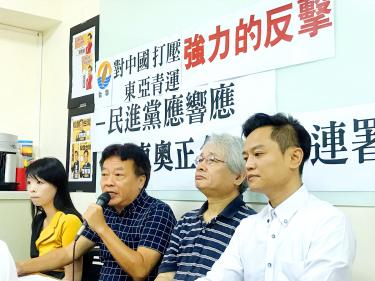The Taiwan Solidarity Union (TSU) yesterday called on the Democratic Progressive Party (DPP) to promote a referendum proposed by civic groups to rename the national sports team from “Chinese Taipei” to “Taiwan” for the 2020 Tokyo Olympics, which it said would be the most effective way to resist pressure from China.
The East Asian Olympic Committee on Tuesday last week revoked Taichung’s right to host the first East Asian Youth Games in August next year.
In a statement issued the following day, China’s Taiwan Affairs Office spokesman An Fengshan (安峰山) cited the proposed referendum as the reason for the committee’s decision, saying that it contravened a 1981 agreement between the International Olympic Committee and the Chinese Taipei Olympic Committee to name the team “Chinese Taipei.”
While President Tsai Ing-wen (蔡英文) has expressed support for Taichung’s decision to appeal the decision and has said Taiwanese are blameless, she needs to take more concrete action, TSU Chairman Lau Yi-te (劉一德) told a news conference in Taipei yesterday.
Tsai’s consistent attempts to please and appease China over the past two years have only encouraged Beijing to continue bullying Taiwan in all possible ways, from carrying out aerial exercises around the nation and forcing international airlines to change their designations for Taiwan to blocking its participation in international organizations, he said.
“As compromise has led to few results, the president must take a tougher approach,” Liu said, calling on Tsai to mobilize all DPP members to support the referendum.
The proposal’s organizers have about 100,000 signatures and must gather another 180,000 to meet the threshold for holding a referendum, he said.
As of Thursday last week, the TSU had collected 4,600 signatures for the referendum proposal, while Taiwan Radical Wings, the New Power Party and the Green Party had gathered 2,900, 535 and 20 signatures respectively, TSU women’s section director Ouyang Jui-lien (歐陽瑞蓮) said.
Meanwhile, the DPP, along with the Chinese Nationalist Party (KMT), the People First Party and the Social Democratic Party, have collected zero, she added.
The Tsai administration and the DPP have clearly stayed away from the referendum proposal, Ouyang said, adding that at its most recent national congress, the DPP even revoked a proposal to discuss supporting the petition.
“If the referendum proposal does not pass, Beijing will assume that its bullying was effective, which would further hurt pro-Taiwan parties,” she said.
Taiwanese athletes have the right to use the name “Taiwan,” which has been used to represent the nation in the Olympic Games, award-winning screenwriter and author Neil Peng (馮光遠) said.
“There have been precedents of nations competing in international sporting events under different names. Taiwanese must not hesitate to rename themselves for fear of outside factors,” he said.
Source: Taipei Times - 2018/08/01





















